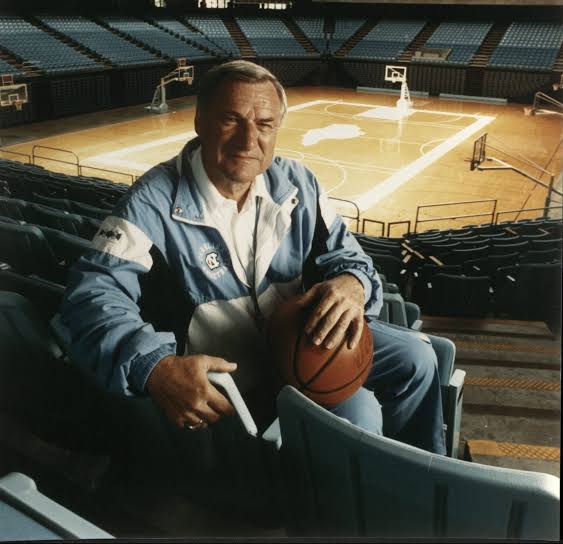CHAPEL HILL, N.C. — In the heart of Carolina basketball, where banners wave and legends are born, one name echoes louder than all others: Dean Smith. The man who turned UNC into a national powerhouse, who coached Michael Jordan before the world knew his name, and who taught generations that basketball is more than a game — it’s about character, unity, and purpose.
Long before the bright lights and March Madness cameras arrived in Chapel Hill, it was Dean Smith who laid the foundation for one of the greatest dynasties in sports history. When he took over the program in 1961, UNC was still building its identity. By the time he retired in 1997, Smith had created a culture, a philosophy, and a blueprint that coaches across the country would try to copy — but never quite duplicate.
Smith’s career record — 879 wins, 254 losses — made him the winningest coach in NCAA history at the time. But for UNC fans, it wasn’t the number of wins that defined him. It was the way he won. The unselfishness. The class. The calm under pressure. And the absolute dedication to his players, many of whom still refer to him not just as coach, but as a second father.
His on-court résumé is legendary: 2 national championships (1982 and 1993), 11 Final Four appearances, 13 ACC Tournament titles, and 27 consecutive seasons with 20+ wins. He coached countless All-Americans and future NBA stars, but no name looms larger than Michael Jordan. Even MJ famously said, “Dean Smith is the only person who could ever stop me — and he did it by keeping me on the bench.”
But Dean Smith’s greatness went far beyond basketball. In the middle of the 1960s civil rights movement, Smith quietly made history by recruiting Charlie Scott, the first Black scholarship athlete in UNC basketball history. It wasn’t a headline for him — it was simply the right thing to do. That’s who Dean Smith was: a man of action, of conviction, and of courage.
He also revolutionized the game itself. His Four Corners offense was so effective at stalling games that the NCAA was forced to implement a shot clock. He emphasized team play over individual stats, even making UNC the first program to track assists as an official stat. That’s why to this day, Carolina basketball is known for its fluid ball movement and selfless stars.
In the locker room, Smith was just as powerful. He handed players books, challenged them on current events, and called for quiet reflection before big games. When a player left the program — whether a star or a benchwarmer — they always received a handwritten note from Coach Smith. And when his players made mistakes, he corrected them with dignity, never humiliation.
Even after retirement, Dean Smith’s influence never faded. His coaching tree — which includes Roy Williams, Larry Brown, and George Karl — has won championships at every level of the sport. His moral compass, meanwhile, inspired many of his players to become leaders in their own right — on the court, in business, and in life.
When Smith passed away in 2015, the tributes poured in from every corner of the basketball world. President Barack Obama awarded him the Presidential Medal of Freedom. Michael Jordan wept. Chapel Hill stood still. And the basketball community realized that it had lost more than a coach — it had lost a teacher, a builder, and a symbol of what sports could be at its best.
Today, UNC’s legacy remains strong, and its foundation is Dean Smith. He built the house. He set the standard. And whether you’re a freshman on the roster or a fan in the bleachers, you can feel his presence in every pass, every defensive stand, every Carolina blue jersey. Dean Smith wasn’t just the greatest coach in UNC history — he was the soul of Carolina basketball.
And in Chapel Hill, legends never die — they simply live on through the game they shaped.





























